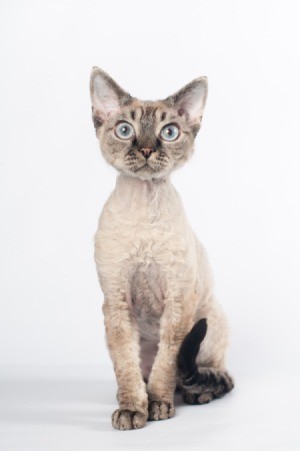 Breed Description: The Devon Rex has a soft, curly coat similar to that of the Cornish Rex, but displays some other very different characteristics. Unlike the Cornish Rex, the Devon Rex's coat is fuzzier and less curly, and it has less of an arch along its back. Its neck also seems much too small and fragile to support its broad, triangular head and it's somewhat smaller in overall size than the Cornish Rex.
Breed Description: The Devon Rex has a soft, curly coat similar to that of the Cornish Rex, but displays some other very different characteristics. Unlike the Cornish Rex, the Devon Rex's coat is fuzzier and less curly, and it has less of an arch along its back. Its neck also seems much too small and fragile to support its broad, triangular head and it's somewhat smaller in overall size than the Cornish Rex.History & Origin: This breed originated after the Cornish Rex, in the county of Devon, England. A curly-haired kitten was born and appropriately, it was named Kirlee. Breeders decided to breed Kirlee to Kallibunker, the curly-coated Cornish Rex discovered ten years earlier in the nearby town of Cornwall. They reasoned that the coat mutations in the two cats must be the same. They discovered it wasn't when Kirlee and Kallibunker's offspring were all born with straight coats. Breeders then decided to develop the second coat mutation separately and named it after the county of Devon.
Character & Temperament: The Devon Rex prefers the company of family and can become despondent, almost to the point of becoming ill, when forced to spend time alone. For those spending lots of time away during the day, this breed is not a good choice. Like the Cornish Rex, the Devon Rex can be taught tricks and excels at climbing. This docile breed is extremely good with children and gets along well with other family pets. Gentle and affectionate, this breed thrives on human companionship.
Color: All colors and patterns.
Coat Type: The Devon Rex's coat is short, fine, wavy and soft. It feels somewhat coarse to the touch, and unlike the Cornish Rex, has protective guard hairs as well as an undercoat.
Grooming: This breed's coat sheds very little and is a good choice for people with allergies. The coat should be groomed carefully with a soft brush or simply stroked often. Claws should be trimmed when necessary. This breed produces a relatively large amount of earwax and needs its ears clean more frequently than other breeds.
Health Considerations: The Devon Rex's coat is fragile and this breed should be protected against extremes in hot and cold temperatures.
Trivia: Due to its gentle, sweet nature and elongated, elegant features, the Devon Rex has often been called 'the greyhound of the cat fancy.
Check out these photos.